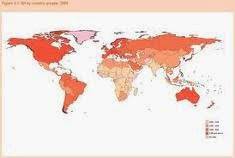There is plenty of comment at this time on the 10th anniversary of the UN Millenium Goals. There are this week lots of questions –were they too ambitious, too vague with too many countries willing to make rash promises of large amounts of cash for the developing world and not having much intention of delivering?
Does the entire process have to be re-thought so that it is more transparent and accountable? For example the Financial Times criticizes the Millenium Development Goals for being unrealistic
“Achieving universal primary education and halving the proportion of hungry people in 1990 was a daunting, if not impossible, task.”
Jeffrey Sachs avers that the system is “broken” and needs to be rethought.
“we must replace the fragmentation of bilateral programmes with a new strategy based on multi-donor pooled funding that has clear timelines, objectives and accountability.”
Bono a well known celebrity fighter for these goals (that he refers to as MDG) writing in the New York Times, thinks the record is better than Sachs and others are prepared to make out,
“Tens of millions more kids are in school thanks to debt cancellation. Millions of lives have been saved through the battle against preventable disease, thanks especially to the Global Fund to Fight AIDS, Tuberculosis and Malaria. Apart from fallout from the market meltdown, economic growth in Africa has been gathering pace — over 5 percent per year in the decade ending in 2009. Poverty declined by 1 percent a year from 1999 to 2005.”
Bono however, agrees with Sachs however that there is a greater need for transparency,
“Right now it’s near impossible to keep track. Walk (if you dare) into M.D.G. World and you will encounter a dizzying array of vague financing and policy commitments on critical issues, from maternal mortality to agricultural development. You come across a load of bureau-babble that too often is used to hide double counting, or mask double standards. This is the stuff that feeds the cynics.”
He recommends the creation of an independent unit “made up of people from governments, the private sector and civil society — to track pledges and progress, not just on aid but also on trade, governance, investment. It’s essential for the credibility of the United Nations, the M.D.G.’s, and all who work toward them.”
As the major western donors struggle with recession –a clear need is to help explain to the people why we need to care about these goals. Goals that did start out in 2000 as quite simple and obvious such as Goal 1 to eradicate poverty
Target 1:
Halve, between 1990 and 2015, the proportion of people whose income is less than $1 a day of poverty had diminished in almost every region
Target 2:
Achieve full and productive employment and decent work for all, including women and young people
Target 3:
Halve, between 1990 and 2015, the proportion of people who suffer from hunger
Contrary to what Bono claims the data is not "impossible track"--the UN data is pretty good in showing you the progress towards the goals through such items as interactive maps that show the passage of time regarding key indicators such as the number of people in the world who are living on $1 dollar a day in 2010 compared to 2000 when the MDG were first established:
But Obama is right the information is scattershot and not clearly presented so that a voter could see where his or her money went to what program and with what result.
Another part of the problem, perhaps a more important one, seems to be the media’s difficulty in reporting on long term stories. The TV news is much happier with reporting dramatic incidents and accidents than offering stories that require the perspective of time. When the politicians announce a the famous summits whether it be at “Monterrey in 2002 (to reach 0.7 per cent of GNP in development aid), Gleneagles in 2005 (to double African aid by 2010), L’Aquila in 2009 (to direct $22bn over three years to raise productivity of smallholder farming) and Copenhagen in 2009 (to add $30bn over three years for climate change adaptation and mitigation)” it captures the TV headlines but does not register. Nor does the story of why what these seemingly vast sums mean in terms of real change on the ground—better nutrition, less disease and how these amounts we are spending which are bare fractions of our GDP compare to the extent of the problem. President Obama clearly had in mind the country’s mood, to steer towards less foreign entanglements and less intervention, when he made his remarks before the UN General Assembly the other day concerning the MDG , 'With our economies struggling, so many people out of work, and so many families barely getting by, why a summit on development?' " Obama told an audience of several hundred people in the U.N. General Assembly hall. "The answer is simple. In our global economy, progress in even the poorest countries can advance the prosperity and security of people far beyond their borders, including my fellow Americans."
President Obama is right of course to frame the debate that way if it means gaining the support of the US Congress during a time of national austerity –but the media has to be able to help shape the story and tell the positive stories about International AID such as the Global Fund to Fight Aids, TB and Malaria, which argues Sachs is a better model than the MDG offers because it “pools resources from many donor nations, with an independent review board approving national programmes according to scientific and management criteria rather than bilateral politics. Educators must do their part too to keep up and explain the story that too many of our leaders and our media have failed to illuminate.


No comments:
Post a Comment